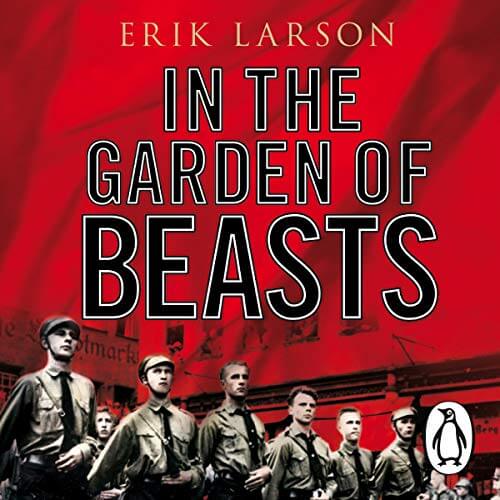In the Garden of Beasts by Erik Larson Audiobook Review
In the Garden of Beasts Audiobook: Hoye’s Riveting Narration Breathes Chilling Life Into Larson’s Portrait of 1930s Berlin. Within Erik Larson’s powerful canon reconstructing some of the 20th century’s most pivotal and painful historical epochs, few works have attained the status of unwavering timeless quite like In the Garden of Beasts. This shocking vivisection of 1930s Berlin during the escalating stranglehold of Nazism stands as the author’s critical artistic statement, an unsparingly rendered excavation of humanity’s limitless capability for wickedness and cruelty amidst the deceptions of ethical surrender.
The Ambassador’s Ultimate Reckoning
In the heart of In the Garden of Beasts is William E. Dodd, a modest and respectable teacher from the University of Chicago. Despite his devotion to reality and his optimistic trust in the impact of reasoning, Dodd appeared a not likely choice for the challenging role he took on in Berlin in 1933 as an ambassador for the brand-new Roosevelt federal government.
Throughout Hoye’s marathon 12 hrs and 52 minutes, the listener becomes irreversibly enveloped in the maelstrom of insidiousness changing the world’s cultural capital from the brilliant beacon of liberal ideals into the gestating heart of Nazi darkness. All the while, Dodd’s unwavering Jeffersonian rectitude – manifested most clearly through his daughter Martha’s ravenous social cravings – gets disturbingly allegorised as a lamb being circled by significantly brazen predators before the massacre commences.
An Unsettling Normalisation of Tyranny
From the start as Dodd commences his ambassadorial tasks, Hoye summons a portrait of staid earthiness and naivete toward the stormclouds amassing – subtly invoking the cultured Southern mannerisms and moralistic caution ingrained within the academic’s background. Yet as Hitler’s machinations start inexorably tightening their grip on the population through obvious display screens of savagery and dog-whistle overtures towards a frothing minority, the storyteller lends jarring smears of apprehension into the stoic teacher’s character.
Those tiny shivers of alarm steadily escalate into bristling atmospheric dread nipping at the edges of every line delivery, up until audiences find themselves metabolically recoiling from the merest oblique hints seeding Nazi totalitarianism further into Berlin’s soil with grotesque banality. Each inefficient swallow of appointment from Dodd manifests on the airwaves like a silent weighted plea versus impending horror – just to be addressed with higher impudence as subjugation becomes a public phenomenon. Hoye renders the prevalent environment with such immersive strength, that audiences may naturally clutch for the armrest from large unsettling vicarious stress.
Beyond the Emergency’s Intimacies
Yet for as unshakably as In the Garden of Beasts lets audiences inhabit the ominous miasma of installing national fear and historic import through Hoye’s spellbinding vocals, it’s the production’s haunting you-are-there viscerally throughout smaller-sized sections that burn permanence into the mind’s innermost problems.
Sequences of Dodd and Martha coming across the oppressive banality of anti-Semitic propaganda leafleting citizens during regular errands instil panic through Hoye’s curt removed accusatives all of a sudden taking his cadence in disorienting fits. Hushed parlour gossip and intrigue from soirees swirling with leering Gestapo informants curdles with treacherous hazard through his conspiratorial whispers tinged with lips licking the sweat off the palate. Tension coils through the stillest audial unfavourable spaces between sentences – restricting listeners further into distressed asphyxiation until the next unimaginable outrage bursts the horrible stress yet again.
An Audiobook Achievement for non-fiction
At the foundation, Stephen Hoye’s acoustic resurrection of Erik Larson’s immeasurably rich text crystallizes into an adventurous aesthetic declaration eclipsing the sum of its already significant strengths on the page. It becomes a singular, all-encompassing experience unto itself – transferring audiences through the unfathomable brittleness separating a cultured European democracy at its pinnacle from ending up being a gaping void of genocidal dehumanisation within years.
Discoveries of how easily a regime of civilized barbarians can pervert and deprave national awareness of bedrock humanitarian worths through cravenly opportunistic distortion show up with extensive bone-curdling weight. You’ll ponder how delicate appeal and grace remain when willful indifference allows hatred to metastasize in plain sight solely for efficiency’s sake. And many chillingly, you’ll reckon with why those sworn to support virtue’s perfects above reproach so easily succumbed to silence and detachment instead of stepping in.
In the middle of the 21st century currents of isolationist ethnonationalism and authoritarian regression increasing once again, Stephen Hoye’s spellbinding vocal evocation of those extremely crossroads nexus points across the years brings all the jolting seriousness of air-raid sirens. His vital audiobook contribution ensures Larson’s meticulous prose withstands as more than empirically exact historical reconstruction – it serves long-lasting deterrent tip for those who’d cavalierly enable evil’s temptations and the redemptive powers of vigilance to seduce once again.
In the Garden of Beasts’ audiobook, stands as an indisputable example of artistic narration. Listeners will emerge from this painful, fascinating journey shaken, and disrupted, but smarter to the depths of our power as civilized beings to avert Hell’s repeating through uncompromising moral courage and collective custodianship. Our future’s notions of peace and dignity rest upon engaging completely with such extensive testimonies – burnt throughout eternity through Hoye’s never-ceasing skills.

